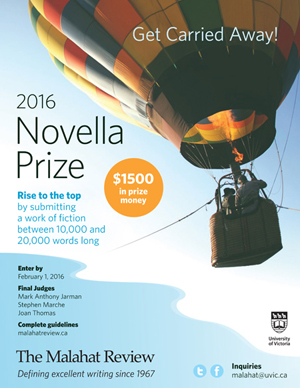
Rise to the top: the Novella Prize is back! Think of the novella as a short story fit for royalty. You'll win a cash prize of $1500, publication in 2016, and an interview to talk (and gloat) about your winning piece.
This contest is only offered every other year, so take time over the holidays to create, tame, and perfect your behemoth! Deadline is February 1, 2016.
This year's contest judges are Mark Anthony Jarman, Stephen Marche, and Joan Thomas.
Entry fees vary by location. All entrants will receive a one-year subscription to The Malahat Review.
Full contest guidelines available on the Malahat website.
Mark Anthony Jarman
 Malahat volunteer Rachael Kearley talks about sense of place, displacement, and writing on the road with contest judge Mark Anthony Jarman.
Malahat volunteer Rachael Kearley talks about sense of place, displacement, and writing on the road with contest judge Mark Anthony Jarman.
RK: In your opinion, what differentiates the novella form from the short story or the novel? What are you looking for in this competition?
MAJ: I hope I’m open in terms of what we’re looking for. As Atwood says, art is what you can get away with. Obviously the novella fits a pleasing range between a story and a novel. I’ve taught Time’s Arrow by Martin Amis and Conrad’s Heart of Darkness and they are a good length for a class list.
Read the rest of Mark's interview on the Malahat website.
Stephen Marche
 Malahat volunteer Sarah Brennan-Newell talks about novellas as half-marathons with contest judge Stephen Marche.
Malahat volunteer Sarah Brennan-Newell talks about novellas as half-marathons with contest judge Stephen Marche.
SBN: How does your experience being previously published in The Malahat Review compare with judging this contest? How did you know your piece was a short story and not a longer work?
SM: I think basically you can't set out to write a novella. A novella is either a novel that crumbles, or a short story that spirals out of control. The spiralling and the crumbling can both be magnificent. That story was exactly the right size for what it turned out to be.
Read the rest of Stephen's interview on the Malahat website.
Joan Thomas
 Malahat volunteer Noah Armstrong talks about illuminations, pragmatism, and the intensity of the novella with contest judge Joan Thomas.
Malahat volunteer Noah Armstrong talks about illuminations, pragmatism, and the intensity of the novella with contest judge Joan Thomas.
NA: Novella is a sub-genre leading up to novels. What are the universal valuable aspects of novella fiction that make it a lasting and valued genre?
JT: Novellas are the perfect vehicle for an unusual point of view or voice that would be hard to sustain for three hundred pages, or for probing a single arresting incident: What if this happened? Just this?
Nobody writes novellas for pragmatic reasons; they’re too hard to publish. So when I read a novella I know the writer was compelled by an artistic impulse, and that’s always good.
Read the rest of Joan's interview on the Malahat website.